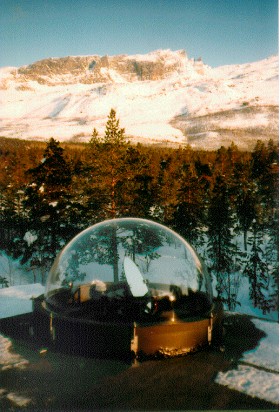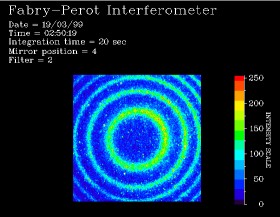
|
FPI
|
 |

|
FPI
|
 |
 The Fabry-Perot interferometer (FPI) is designed to make routine
observations of thermospheric and mesospheric winds and temperatures.
This is done from observations of the Doppler shift and Doppler
broadening, respectively, of suitable airglow and auroral optical
emissions. The instrument started recordings in 1996. The
The Fabry-Perot interferometer (FPI) is designed to make routine
observations of thermospheric and mesospheric winds and temperatures.
This is done from observations of the Doppler shift and Doppler
broadening, respectively, of suitable airglow and auroral optical
emissions. The instrument started recordings in 1996. The
![]() EISCAT radar can measure ion
velocities and temperatures with high height resolution. The close
proximity of the two experiments allows ionospheric-thermospheric
interactions to be studied in the auroral zone over northern
Scandinavia. Unmanned measurements are automatically made for all dark periods.
EISCAT radar can measure ion
velocities and temperatures with high height resolution. The close
proximity of the two experiments allows ionospheric-thermospheric
interactions to be studied in the auroral zone over northern
Scandinavia. Unmanned measurements are automatically made for all dark periods.
The following wavelengths are currently used in different altitude ranges where Un, Tn, Vi and Ti are the neutral wind, neutral temperature, ion velocity and ion temperature respectively.
| Emission | Wavelength (nm) | Height (km) | Quantity |
|---|---|---|---|
| OIS | 557.7 | ~ 97 and > 100 | Un + Tn |
| OID | 630.0 | ~ 260 +- 20 | Un + Tn |
| OIIP | 732.0 | ~ 280 +- 80 | Vi + Ti |
| OH(6,2) | 843.0 | 87 +- 3 | Un + Tn |
 The experiment is equipped with a steerable mirror system permitting any
part of the sky to be viewed. The time resolution per measurement is 1-5
minutes depending on wavelength and actual geophysical conditions. The
actual height of the emission observed is always uncertain as this is
a passive experiment.
The experiment is equipped with a steerable mirror system permitting any
part of the sky to be viewed. The time resolution per measurement is 1-5
minutes depending on wavelength and actual geophysical conditions. The
actual height of the emission observed is always uncertain as this is
a passive experiment.
| © 2006, Max Planck Institute for Solar System Research, Lindau |
Kosch 14-05-1999 |